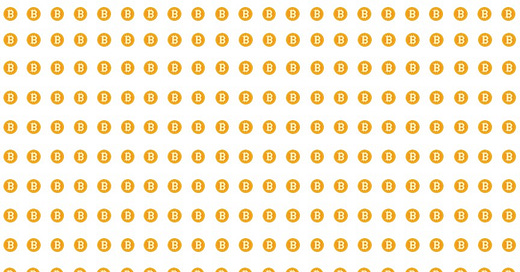Something was wrong. Jeff was looking at a transaction that shouldn’t exist. In fact, based on everything he knew about Bitcoin, Jeff was looking at a transaction that COULDN’T exist. But there it was. Someone had managed to spend billions upon billions of bitcoin between wallets, even though only a few million bitcoin currently existed.
Something had to be done, and fast. The Bitcoin blockchain was just in its infancy. An experiment really, and if this error, this glitch in the code, wasn’t fixed soon, it would kill the Bitcoin experiment. But there was no IT team for Bitcoin. No, if this issue was going to be fixed, he and the ragtag group of developers on the Bitcoin forums would have to run with it and hope for the best.
The above account is a dramatization that is loosely based on the reported events surrounding the value overflow incident in 2010 that led to the temporary creation of 184 billion bitcoin. As such, it should not be taken as completely factual.
Dear Readers,
The valuation of financial instruments like securities, currencies, and commodities is next to impossible. Their value should be driven by a simple comparison of supply against demand. The problem is that their supply is constantly changing: governments print their currencies into oblivion, companies dilute existing securities through stock issuances, and more and more resources are constantly being pulled from the earth. Perhaps the worst part of all though is that outsiders, the primary drivers of demand for those financial instruments, have no way of knowing when the supply will change or by how much.
In a rather unfortunate twist, this same issue has come to plague much of the crypto space. Many crypto coins and tokens have no supply cap at all, and many that theoretically do have caps could easily lose them if the developers, stakers, miners, or DAOs in charge decided to alter the code base. Crypto is meant to be a paradigm shift compared to the traditional finance of the past several centuries, and perhaps it still can be. All is not lost. But as it stands now, there are many examples of crypto’s powerful elite getting rich at the expense of everyone else.
Bitcoin is meant to be the bastion of security & autonomy, not just within crypto, but generally in finance and throughout the world. After all, the code base is legendary, being the blockchain that started it all, and its immutable supply cap ensures that the accrued value of humanity’s aggregated efforts can never be stolen through inflation. Bitcoin users can rest assured knowing that their holdings are safe from government and corporate self-dealing.
But what if the supply cap were broken?
A World (Almost) Without Bitcoin
Such was temporarily the case early in Bitcoin’s history. In August of 2010, not much more than a year and a half after the blockchain’s genesis block, a transaction was processed on the blockchain in which two separate wallets each received over 92 BILLION bitcoin. An alarming development to be sure given that the max amount of bitcoin had been irrevocably set at 21 million. It was a glitch that could easily have ended Bitcoin as quickly as the protocol had started. The supply of legitimate bitcoin held by legitimate hodlers would have been dwarfed by the hodlings of a hacker. Users would lose faith in the promised features of the Bitcoin blockchain, and all bitcoin would be worthless.
Luckily, the problem was fixed relatively quickly. In a world where giants like Facebook and Amazon, with armies of developers and IT staff, can go down for an entire day or more, an obscure blockchain network with a decentralized group of freelance developers was able to overcome a zero-day vulnerability in its token supply in just five hours. The blockchain went through a soft fork that restarted the ledger from right before the “bad” transaction occurred and introduced an update to block the reappearance of the error that started it all: Integer Overflow.
Completely Over With the Bitcoin Overflow
Techopedia defines Integer Overflow as follows:
Integer overflow is the result of an attempt by a CPU to arithmetically generate a number larger than what can fit in the devoted memory storage space. Arithmetic operations always have the potential of returning unexpected values, which may cause an error that forces the whole program to shut down.
In the case of Bitcoin specifically, the original blockchain code didn’t include a directive for the network to automatically reject any block where the sum of the transaction was higher than allowed. In order to ensure that the glitch was never replicated, an updated version of the blockchain software was introduced that rejected any transaction with an integer overflow and, for good measure, any transaction at all that included more than 21 million bitcoin as an output.
Bitcoin: A Lesson In Resiliency
While Bitcoin’s technology is revolutionary, it is not perfect. The Bitcoin blockchain has undergone various fixes and improvements over its lifetime and continues to move forward, bringing in new participants and securing their wealth. Bitcoin is more than just the sum of its parts, and has thus far resisted any issue, within the code or not, that has tried to take the network down.
Read the next article in this series:
Scams.
Rugpulls.
Shady companies that will take away your hard-earned money the first chance they get.
That’s what most content creators in the Bitcoin and Crypto spaces offer their communities in exchange for the *free* content they promote in newsletters, on talk shows, on social media, and anywhere else they can peddle their wares.
YOU DESERVE BETTER.
You deserve quality Bitcoin education that isn’t driven by a need to sell you something that will leave you worse off. You deserve thoughtful analyses of Bitcoin basics and current events that leave out the biases that permeate affiliate-driven content platforms. You deserve a community that puts you first, no matter what.
We’ve built the HiFi Bitcoin community together as a place where quality Bitcoin education comes without any hidden agenda. A place where you come first, always.
If you believe that Bitcoin education should be available to everyone without bias and without ulterior motives, I ask you to please consider supporting me and the work I’m doing for the Bitcoin community through a premium membership. Every contribution increases my ability to cut through the noise and find the truth about Bitcoin with you.
A Special Bonus For Premium Members
In my new book, The Ultimate Pocket Bitcoin Glossary, I walk you through 30 of the most important terms you need to understand in order to get ahead in your Bitcoin journey. My hope is that it can be used to educate yourself about Bitcoin and as a quick reference when you’re trying to help others understand why you’ve chosen to purse a passion for Bitcoin.
Ready to read it yourself?
Premium subscribers of The HiFi Bitcoin Letters receive access to The Ultimate Pocket Bitcoin Glossary at no extra charge:
Free subscribers and non-subscribers can purchase The Ultimate Pocket Bitcoin Glossary, without the commitment of subscribership, in the HiFi Bitcoin Shop, as a PDF:
Wish You Could Easily Take The Podcast With You?
Can’t Get Enough Bitcoin In Your Life? Follow Me On Social Media:
Bitcoin Roundup 🤠
Bitcoin Sovereignty: Bitcoin, with monetary policy written unchangeably in code, is a vast improvement over fiat currencies that allow incumbent governments to leech off of their citizens. Read more
Bitcoin City, USA: The city of Abilene in Texas has announced that it will build a $2.4 billion dollar data center for Bitcoin mining and other projects in a venture with Taylor County and Lancium, an infrastructure company. Read more
Hyperbitcoinization: Jack Dorsey, CEO of Block, has indicated that he believes Bitcoin will replace the dollar as the world reserve currency. Read more
Into the Twitterverse 🐥
There are unfortunately quite a number of outright scams in the “Crypto” world:


The level of hypocrisy is astounding:

🙋🏽♂️Did you enjoy this edition of The HiFi Bitcoin Letters?
This 3-question survey is your chance to tell me how I can improve the newsletter for you.
This is not financial or business advice. This newsletter and related content are for informational purposes only. Cryptocurrencies and digital assets can be risky. Always do your own research before making any sort of investment.

















Share this post